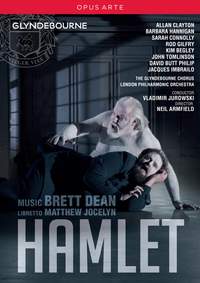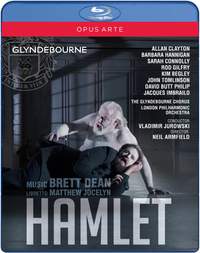Interview,
Allan Clayton on Brett Dean's Hamlet
 After my recent interview with composer Brett Dean about his new opera Hamlet, which premiered at Glyndebourne last summer and has recently been released on DVD and Blu-ray by Opus Arte, I decided to get in touch with production’s protagonist to hear his side of the story: the young British tenor Allan Clayton won widespread acclaim for his portrayal of Shakespeare’s ‘blown youth blasted with ecstasy’, with The Spectator praising his ‘fearless mastery’ of the role and The Times describing him as a worthy rival to Benedict Cumberbatch and Sir John Gielgud.
After my recent interview with composer Brett Dean about his new opera Hamlet, which premiered at Glyndebourne last summer and has recently been released on DVD and Blu-ray by Opus Arte, I decided to get in touch with production’s protagonist to hear his side of the story: the young British tenor Allan Clayton won widespread acclaim for his portrayal of Shakespeare’s ‘blown youth blasted with ecstasy’, with The Spectator praising his ‘fearless mastery’ of the role and The Times describing him as a worthy rival to Benedict Cumberbatch and Sir John Gielgud.
I spoke to Allan whilst he was preparing to sing the role of Jonathan in the revival of Barrie Kosky’s stunning production of Handel’s Saul at Glyndebourne about his collaboration with Dean and the librettist Matthew Jocelyn, and the vocal and dramatic challenges involved in bringing this particular version of the Prince of Denmark to the stage…
At what stage did you get involved with the project, and how much input did you have whilst the score and libretto were being drafted?
I was on board all along, which was perfect, because it meant that Brett and Matthew had me in mind before they even began writing. Brett and I first met about two-and-a-half years before we actually did the show; we talked about my singing in general, and then I just read through the soliloquies and recorded them so that Brett could hear how they sounded in my speaking-voice. We kept in touch for the next eighteen months or so, and he’d come out to see me in whatever Mozart or Rameau I was doing at the time; then about a year before the premiere we had some fantastic workshops involving John Tomlinson and one or two others, and at that stage Brett hadn’t yet written the aria for ‘To be or not to be’, so Matthew and I had a lot of discussion about how that should be placed and staged. And one other passage we talked about a lot was my duet with Ophelia: I was desperate to have a moment of stillness for Hamlet there. He spends so much of the piece charging around the stage like some rampaging bull in a china shop! All in all, I had far more input than with anything else I’ve ever done.
Matthew Jocelyn's libretto plays not just with the different versions of Hamlet, but also with the order and in some cases even line-allocation - was that disconcerting or liberating?
Oh, I loved it, and I think Matthew’s an absolute genius! The thing about doing an opera on Hamlet is that people will buy tickets who aren’t necessarily opera-goers, because they love Shakespeare or because they just know the story – and to then be able to subvert their expectations by playing with the dramatic arcs and the storyline itself (not mention the various versions of Shakespeare’s original text) was just brilliant.
Hamlet is famously a play which is full of ambiguities and questions (for instance, whether Hamlet’s madness is entirely feigned, and whether the Ghost is a hallucination): does the new libretto attempt to pin any of those things down?
I spent a lot of time thinking about these things, yes: I read the various versions of the text, watched several productions on DVD, and went to see the Andrew Scott production at the Almeida. But because there’s so much text that isn’t included in the opera, you then need to make decisions about which bits of the character you bring in because you know them from the play rather than from the 260 pages or so of this libretto – for instance, we cut the whole plotline of Hamlet going to England, so you have to think about where’s he coming back from, why hasn’t he heard about Ophelia’s death…So in a sense the libretto did answer some of the usual questions which hang over Hamlet, but it generated plenty of new ones as well!
Did any particular actors influence your portrayal of the character?
I hugely admire Andrew Scott and I thought his Hamlet was fantastic, but I didn’t then think ‘Well, that’s how I’ll do it!’. I spoke to a couple of other actors who’ve played Hamlet beforehand and since, including Sam West and Simon Russell Beale, and they both said ‘This will be your Hamlet’ – there’s no way of copying anything or anybody in that role, even in something as specific as an opera where things like rhythm and phrasing are far more prescribed than they are in straight theatre. And when David Butt Philip [who sang Laertes in the premiere] took over the role of Hamlet on the Glyndebourne tour, I knew that it would be completely different from how I did it, even though it was the same production. You have to find the lines that Hamlet speaks or sings that mean something to you and then use that to direct the character, so I think it’s always going to vary dramatically with each individual performer.
Did your conception of the role (and the piece as a whole) evolve over the course of those eight performances at Glyndebourne?
Oh, it felt completely different every night – until the production opened, I don’t think any of us had a really clear idea of what this Hamlet was going to be, and so it was a process of continual aspiration right up until that first night…actually, make that well beyond the last night! We did it again in Adelaide in March, and that was a great opportunity to do another three shows as part of the Festival there: it was the same production, but with different people playing my father and Ophelia and Gertrude, so suddenly things shifted again. And I think it's a good thing that we never stopped learning throughout the entire process!
Which aspects of the role were most vocally challenging?
Simply having the stamina for the final scene – after last show we did in Adelaide, Vlad Jurowski came up to me and said ‘This is the first one you’ve done where you didn’t sound knackered at the end!’. With most singers, we only really find out how to perform a role when we do it on stage with an audience - the work in the rehearsal-room is mainly about blocking and characterisation. And the other killer is Scene 8, right before the end of Act One, which is really in three separate parts: you start off with Polonius hiding behind the arras, then the Ghost comes in, then you have the epilogue with just Gertrude and Hamlet, and after all of that I still had to have the strength to drag poor 'dead' Kim Begley [Polonius] off the stage!
Finally, did any of your previous roles feed into your interpretation of Hamlet – or do you perhaps see Hamlet feeding into any roles which you might take on in the near future?
Nothing really jumped out at me at the time, partly because Hamlet is so esoteric, but on reflection the parallels between Hamlet and Peter Grimes are pretty strong: The Pleiades Scene from Grimes is essentially ‘To be or not to be…’, and the moment when the chorus sing ‘He’s mad or drunk!’ could easily come from Hamlet. And Grimes is definitely a role I would now consider doing as a result of working on Hamlet...
Allan Clayton, Sarah Connolly, Barbara Hannigan, Rod Gilfry, Kim Begley, John Tomlinson; London Philharmonic Orchestra, The Glyndebourne Chorus, Vladimir Jurowski, Neil Armfield (director)
Available Format: DVD Video
Allan Clayton, Sarah Connolly, Barbara Hannigan, Rod Gilfry, Kim Begley, John Tomlinson; London Philharmonic Orchestra, The Glyndebourne Chorus, Vladimir Jurowski, Neil Armfield (director)
Available Format: Blu-ray




